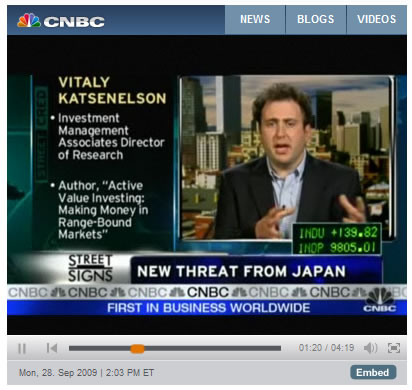On CNBC: Will Japan Drive Our Interest Rates Higher?
Interest-Rates / Japan Economy Oct 10, 2009 - 02:42 PM GMT I was on CNBC a few days ago discussing the Japan debt situation. Here are my talking points and some additional thoughts – a lot of them I did not have a chance to cover in the previous note or the interview.
I was on CNBC a few days ago discussing the Japan debt situation. Here are my talking points and some additional thoughts – a lot of them I did not have a chance to cover in the previous note or the interview.
· Over 90% of Japanese debt is financed internally.
· Japanese debt-to-GDP is 170%, probably even higher than that after you factor in $200 billion plus in stimulus, second only to Zimbabwe .
· Japan has the oldest population in the developed world. Its savings rate has been on the decline since the early 1990s. At its height it was in the mid-teens, now it’s in the low single digits. As people get older they make less money and have higher medical expenses, thus they save less. Also, Japanese are xenophobic – no immigration; population is shrinking.
· At the same time, as the consumer savings rate declines, there is less demand for government debt.
· It is really an issue of supply and demand: to attract investors Japan will have to raise interest rates.
Why does it matter?
· Japan is the second largest foreign holder of US debt (holdings as of July: China $800b, Japan $720b, and the UK a distant third at $200 billion. (However, a year ago Japan was the largest holder of US debt). Japan is an export-based economy. As exports collapse, it has fewer sales in US dollars and less money to park in US dollars. This issue will get resolved if the global economy starts growing again, but the next issue won’t.
· Higher Japanese rates will have significant consequences: they will attract capital away from US debt, and the US will have to raise rates to be competitive. The US Treasury will not be competing against 0.5% interest rates anymore.
· It will put the end to the giant carry trade – Japanese corporations will have little incentive to park their money in the US dollar, as their borrowing costs in Japan will exceed or equal the interest rate they are getting in US dollars.
· Higher interest rates will puncture a huge hole in the Japanese fiscal budget. A 1% increase in rates will cost Japan $60 billion (it has about $6 trillion of debt, is my guesstimate), about 4% of the Japanese budget.
If the US consumer stays a net saver, this would offset these trends at least partially, but before consumers start buying government debt they have to chew through a huge pile of higher-interest consumer debt (credit cards, home equity, car loans etc.).
How much, How long?
· How much will Japanese rates rise? I don’t know; it will depend in large part of what the new Japanese government does about their deficits.
· How long? This is likely to be a drawn-out process. The Japanese consumer savings rate has been in decline for a long, long time. Also, a large portion of Japanese government debt has long-term maturities.
After I wrote the above points, a reader forwarded the following note from Dennis Gartman, which somehow leaves me feeling this whole discussion about China, Japan, and our debt becomes meaningless (sorry for wasting your time):
And the #1 holders of US treasury securities, more than 6 x’s as large as are China’s holdings, and more than the total of the Brazil, the Caribbean banking centres, OPEC, the UK, US Pension funds, States and local entities, “other investors,” Japan, China and US Mutual funds combined, is none other than the US Federal Reserve Bank system. So, when we become too egregiously concerned about the concentration of Treasury debt held by the Chinese, or the Japanese or the Russians et al, we should remember that it is the Fed who trumps’em all and trumps’em hard. We thought ya’ll’d find this interesting; certainly we did.
Twitter thoughts (follow me on twitter ):
· Excellent paper explaining reasons for the decline of the Japanese savings rate http://bit.ly/1rjgyT
· Microsoft proves again that it has no taste – none. Windows 7 party videos are tasteless. http://bit.ly/thSIw
Vitaliy N. Katsenelson, CFA, is a portfolio manager/director of research at Investment Management Associates in Denver, Colo. He is the author of “Active Value Investing: Making Money in Range-Bound Markets” (Wiley 2007). To receive Vitaliy’s future articles my email, click here.
© 2009 Copyright Vitaliy Katsenelson - All Rights Reserved
Disclaimer: The above is a matter of opinion provided for general information purposes only and is not intended as investment advice. Information and analysis above are derived from sources and utilising methods believed to be reliable, but we cannot accept responsibility for any losses you may incur as a result of this analysis. Individuals should consult with their personal financial advisors.
© 2005-2022 http://www.MarketOracle.co.uk - The Market Oracle is a FREE Daily Financial Markets Analysis & Forecasting online publication.




